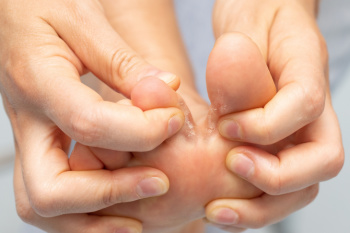 Athlete's foot, also known as tinea pedis, is a fungal infection that primarily affects the spaces between the toes. Anyone exposed to the fungus can become infected, not just athletes. Dermatophytes, the fungi responsible for this condition, thrive in warm, moist environments, making hot, sweaty feet the perfect breeding ground. Symptoms can include redness, cracking, flaking, and itching of the skin, particularly between the toes. Athlete's foot is extremely contagious, spreading through direct contact or via contaminated surfaces like gym locker rooms and communal showers at indoor pools. Risk factors can include eczema, excessive sweating, weakened immune systems, circulation problems, and wearing sturdy, non-breathable footwear. A podiatrist can diagnose athlete’s foot and recommend effective treatments as well as provide preventive measures to keep the infection from recurring. If you have developed an athlete's foot infection, it is suggested that you schedule an appointment with a podiatrist for an exam, diagnosis, and treatment options.
Athlete's foot, also known as tinea pedis, is a fungal infection that primarily affects the spaces between the toes. Anyone exposed to the fungus can become infected, not just athletes. Dermatophytes, the fungi responsible for this condition, thrive in warm, moist environments, making hot, sweaty feet the perfect breeding ground. Symptoms can include redness, cracking, flaking, and itching of the skin, particularly between the toes. Athlete's foot is extremely contagious, spreading through direct contact or via contaminated surfaces like gym locker rooms and communal showers at indoor pools. Risk factors can include eczema, excessive sweating, weakened immune systems, circulation problems, and wearing sturdy, non-breathable footwear. A podiatrist can diagnose athlete’s foot and recommend effective treatments as well as provide preventive measures to keep the infection from recurring. If you have developed an athlete's foot infection, it is suggested that you schedule an appointment with a podiatrist for an exam, diagnosis, and treatment options.
Athlete’s Foot
Athlete’s foot is often an uncomfortable condition to experience. Thankfully, podiatrists specialize in treating athlete’s foot and offer the best treatment options. If you have any questions about athlete’s foot, consult with one of our podiatrists from New England Foot and Ankle. Our doctors will assess your condition and provide you with quality treatment.
What Is Athlete’s Foot?
Tinea pedis, more commonly known as athlete’s foot, is a non-serious and common fungal infection of the foot. Athlete’s foot is contagious and can be contracted by touching someone who has it or infected surfaces. The most common places contaminated by it are public showers, locker rooms, and swimming pools. Once contracted, it grows on feet that are left inside moist, dark, and warm shoes and socks.
Prevention
The most effective ways to prevent athlete’s foot include:
- Thoroughly washing and drying feet
- Avoid going barefoot in locker rooms and public showers
- Using shower shoes in public showers
- Wearing socks that allow the feet to breathe
- Changing socks and shoes frequently if you sweat a lot
Symptoms
Athlete’s foot initially occurs as a rash between the toes. However, if left undiagnosed, it can spread to the sides and bottom of the feet, toenails, and if touched by hand, the hands themselves. Symptoms include:
- Redness
- Burning
- Itching
- Scaly and peeling skin
Diagnosis and Treatment
Diagnosis is quick and easy. Skin samples will be taken and either viewed under a microscope or sent to a lab for testing. Sometimes, a podiatrist can diagnose it based on simply looking at it. Once confirmed, treatment options include oral and topical antifungal medications.
If you have any questions, please feel free to contact one of our offices located in Chelmsford and Newburyport, MA . We offer the newest diagnostic and treatment technologies for all your foot care needs.
